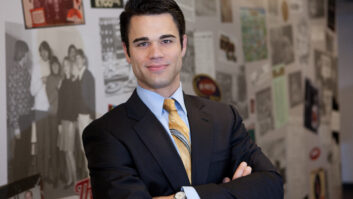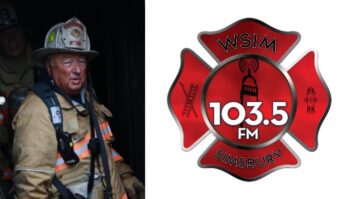Ten years ago, we witnessed the “second window” of major LPFM station buildouts. It produced approximately 2,800 applications. One of those that was granted celebrates a decade of broadcasting this month, from the shores of Wisconsin’s Lake Monona.
It is 3,359-acre lake with 13 miles of shoreline, and it is well-known by anyone who frequents the Badger State’s capital city of Madison. The lake is second in a chain fed by the Yahara River. It freezes over approximately 107 days a year.
On the northwest side of the lake, situated on an isthmus flanked by Lake Mendota, is where the state capitol building is located.

But our story takes us to the east side of the lake. The suburb of Monona has a population of approximately 8,620 and is home to 98.7 WVMO(LP), a station that has worked to truly ingrain itself in the community since it signed on the air on Aug. 20, 2015.
“The Voice of Monona” is the Wisconsin Broadcast Association’s large market station of the year, for the third straight time, as it competes against other Madison and Milwaukee full-power stations.

On Aug. 14, the 100-watt station will celebrate its 10th anniversary with an outdoor concert on the San Damiano lakefront space. The “biergarten” event, between 6–8 p.m., will feature plenty of great beer, of course, and a live performance from nationally-known bluegrass band Wheelhouse. Based out of Madison, they are one of the first local bands ever heard on WVMO.
But the event will also be a toast to WVMO co-founder Lindsay Wood Davis, a long-time Monona resident and member of the Wisconsin Broadcasters Association Hall of Fame.
Co-founder looks back fondly
Davis, 75, spent more than four decades navigating national roles. He was Associated Press Broadcast Services’ director of radio membership, primary management consultant for AMFM, executive vice president of the Radio Advertising Bureau and chief operating officer of New Radio Group — today known as NRG Media.
Tiring of the road-warrior life, he took on the role of vice president and market manager for Entercom’s Madison cluster of stations in the market in the mid-2000s.
It was there where he re-connected with WVMO’s other founder, Tom Teuber, who programmed 105.5 WMMM(FM), which airs an adult album alternative format. Teuber died in 2021, but his fingerprints can be found throughout WVMO.

The chain of events that gave Monona its LPFM commenced in 2007. Radio World detailed it in depth in a 2017 feature, but to summarize: Paul Meyer, a friend who was also an engineer at Wisconsin Public Radio, called Davis, wondering if the city of Monona might be able to apply for an LPFM license.
Bob Miller, Monona’s mayor at the time, was himself a retired broadcaster. Davis and Miller used money previously allocated to a cable access channel to fund the station’s facilities — so the station would be owned by the city.
But it wasn’t until the FCC’s 2013 window that the city could apply for the 98.7 license during the second generation of LPFM filings.

The founders ended up commissioning what Davis described as a “million-dollar engineering team,” a group comprising top-flight engineers from some of Wisconsin’s largest radio groups — all on a volunteer basis. It pays to have friends in the business.
The team did not skimp on equipment, using a Shively 6812 two-bay, full-wave spaced antenna and a Nautel VS300 transmitter. The antenna sits atop Monona’s fire department hose drying tower, a fact the station frequently references in its on-air liners.
In the studio, a Wheatstone Audioarts Air-4 console is its centerpiece.

Community-owned, locally-programmed
While no one else in the Madison radio market was playing similar music, the Americana and “Roots” flavor, cultivated by co-founder Teuber and what WVMO designates as its primary music format, could already be heard echoing in taverns throughout the east side of Madison.
The station’s 100-watt signal does not end at municipal boundaries of course. With its proximity to the Madison isthmus, Davis determined the station reaches approximately 10,000 listeners a week, divided up between three ZIP codes.
“This is a hyper-local station, and it was music we loved and that could be localized,” Davis told Radio World.
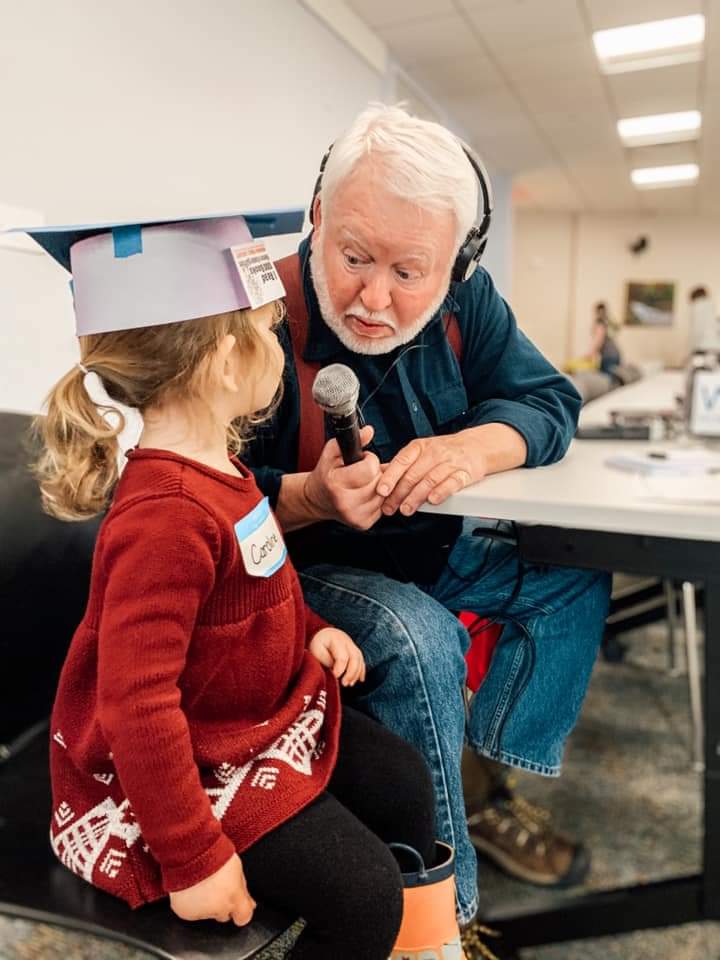
As a result, the station plays two local songs per hour, which could include an artist from Madison or nearby Wisconsin, like the headline band for its anniversary festival, Wheelhouse.
Will Nimmow was hired in 2014 as the director of community media for the city of Monona, just prior to WVMO’s launch. He is also responsible for the student communications program in the city’s school district.
Nimmow studied electronic media at University of Wisconsin-Whitewater. He had prior experience at WISC(TV) and at a media production company. He helped design WVMO’s studio with Davis and other engineering volunteers, of whom included Joe Martin.
Martin started volunteering at the station a week after it came on the air. It was all because of a play-date.
He learned about the station after his daughter’s friend’s mother dropped her off at his home, sparking a conversation about Monona starting a radio station. “She said they are looking for people to come in and volunteer,” he recalled.
“Do you think they’d let me play records?” he asked her.
Martin went to a meeting at the Monona library and connected with Davis and Teuber. He would quickly become involved with programming tasks.
“He also kept the place clean, which is an absolutely critical function at any volunteer station,” Davis noted.
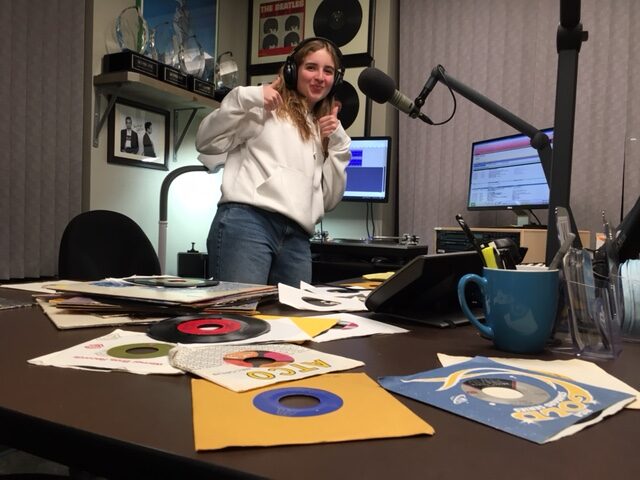
The combination of the station being community-owned, locally programmed and staffed by volunteers is what Davis believes has been the key to its success.
Today, Martin is compensated 35 hours a week as the station director.
His main role is to give the station a consistent “rhythm,” something the trio acknowledge can be a struggle for LPFM stations that rely only on block programs.
While WVMO’s scheduled shows are often outside its Americana format musically, Martin feels its presentation should not change based on who is hosting.
The station is much more than music. Davis said his vision was for local announcements and discussion to be intertwined with songs, rather than the other way around.
“If you’re just a jukebox, it doesn’t matter how good you are,” he said.
Live, from inside city hall
The city’s support, the trio acknowledged, has been invaluable.
WVMO’s studio is located within Monona’s City Hall. As a result, it has been able to capitalize on the community connection. But it’s because the station’s product, Nimmow explained, gives WVMO a “leg-up” in its requests with the city.
“Every time I’ve gone in front of them during budget time and said, ‘here’s what we need done, and we can’t do it without this,’ they haven’t flinched,” he said.
Martin hosts the “’VMO Show,” heard weekdays at 12 p.m., where local officials are often interviewed, including current mayor Nancy Moore.
The mayor also hosts a segment, “Moore About Monona,” where in 60 seconds she will describe city events, ranging from its city council initiatives to a construction project that has just popped up around town.
From big band to bird reports
Most other WVMO shows air once-a-week and are hosted by volunteers. There are 34 such programs currently on its program schedule, the majority hosted by different individuals. Davis is quick to point out that no syndicated programming is heard on WVMO.
Two of the volunteers include the father and son combo of Jeff Perry’s “This Week in Music History,” and “GS 2 BB,” or “Great Songs, Great Singers and Big Bands”, exploring big band-era music, hosted by Jeff’s father, Rod Perry.
It was the elder Perry who had hired Teuber for his first on-air role in Richland Center, Wis., at WRCO(FM).
As evidence of the statiom’s community connection, Grandma Cyd, the public affairs officer at the Madison Fire Department, hosts a Sunday morning classic jazz brunch show. “And it is almost all vinyl,” Davis said — something the station knows very well, having been a multi-occasion “Vinylthon” participant. Many of its offerings include vinyl as a staple.
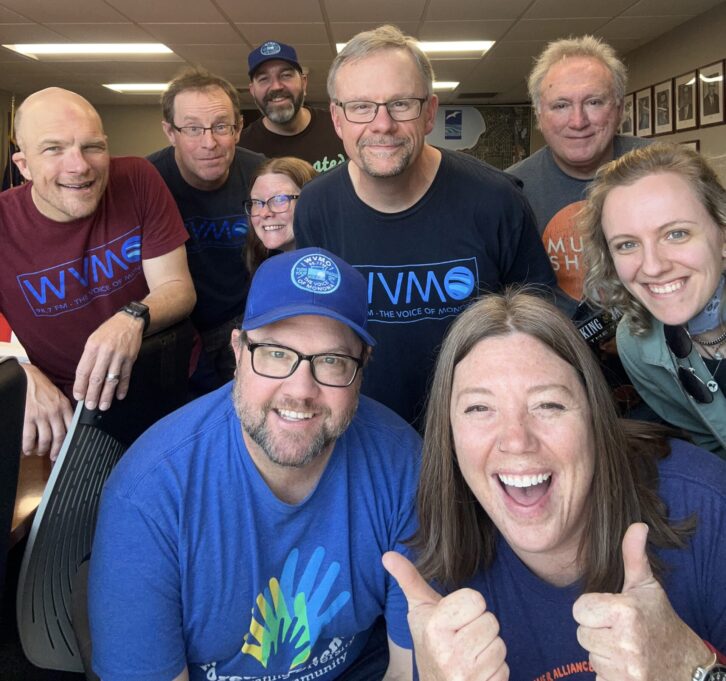
The station features recurring segments outside of its volunteer shows. Listeners have become accustomed to the “Monona Bird Report,” the winner of the WBA’s Best Newscast Award on multiple occasions.
Mary Murrell has hosted the biweekly segment since January 2018. She often gazes out her Monona home’s window for segment prep. Monona became an official “Bird City” in 2017 and got upgraded to a “High Flyer” status this July.
WVMO also has its own jingle package, crafted by local musicians. Nimmow said the package-crafters have come to the station asking to record the jingles, rather than the other way around.
Technology in action
From the day its engineers installed the transmitter and antenna, WVMO has embraced technology. WVMO’s volunteers can come into its studio and host their show, but the station embraced remote recording post-COVID.
The station heavily promotes its online stream. Every song and artist played is reflected in its RDS, something Davis urges other LPFMs to adopt.
Notable is the voice of Dean Rothman, the station’s weather man. “He has a cult following here,” Martin said. One listener came up to director Joe Martin at a Lake Monona event and remarked how hard Rothman must work.

Rothman also happens to be a computer-generated voice. He was creatively named after the intersection of Rothman Place and W. Dean Ave. in Monona.

Ensuring 10 more years
Lindsay Wood Davis plans to gracefully step away from the station after the anniversary concert. As a result, Joe Martin and Will Nimmow are busy scheming ways to ensure the station has a smooth decade to come.
One of its fundraising campaigns is called “adopt-a-watt,” where listeners can pledge to “own” one of its 100 watts for $250, renewable for $100 each year after.
Nimmow said the station’s next step is to work on underwriting partnerships, but not just with any local business. “It is important to find people that match up with our mission,” he said.
Davis feels he’s left WVMO in good hands. The “Godfather,” as he is affectionately referred to, will do his best to stay out of the way and avoid “founder’s syndrome.”
What he founded as part of the second generation of LPFM sign-ons gives other aspiring towns a model to follow. Straight from the shores of Lake Monona.
Radio World welcomes letters to the editor on this or any story. Email [email protected].






